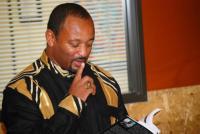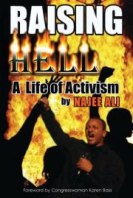 In his newly published memoir, “Raising Hell,” Najee Ali takes readers inside the eventful life of a controversial figure — one whose journey from fearsome gang member to one of Los Angeles’ most recognized civil rights figures has played out largely in public. He recently sat down for a conversation about the book, some of the powerful forces he has confronted and how personal challenges have informed his life as an activist.
In his newly published memoir, “Raising Hell,” Najee Ali takes readers inside the eventful life of a controversial figure — one whose journey from fearsome gang member to one of Los Angeles’ most recognized civil rights figures has played out largely in public. He recently sat down for a conversation about the book, some of the powerful forces he has confronted and how personal challenges have informed his life as an activist.
Why did you decide to write a memoir?
I wanted to chronicle the important events that have transpired not just in South Central L.A., but also nationally. Over the last 20 years, I have worked with, or for, nationally celebrated figures that include President Barack Obama, Rev. Al Sharpton, Martin Luther King III, Rev. Jesse Jackson and the late Michael Jackson. “Raising Hell” gives an insider perspective into what those experiences were like. And also, I wanted to reflect upon the tragic murders of Latasha Harlins, Sherrice Iverson, Tyisha Miller and Trayvon Martin and discuss how we as a community responded to these community crises. The book is a story about adversity, hope, change and redemption. It’s a blueprint for young Black America, to help them overcome the personal challenges they may face in their own lives.
You were born Ronald Todd Eskew. Tell us about changing your name, and why you felt that was important when you converted to Islam.
My conversion to Islam 20 years ago was a life-changing moment for me. Islam — as practiced by over one billion Muslims worldwide — is the faith that professes that, I’m not against Christianity, Judaism, Buddhism, or any religion. I respect everyone’s choice of worship. I just prefer Islam. That’s what spoke to my heart. With a new faith, I chose a new name. I wanted to choose a Muslim name of African origin that I thought best fit my personality and had a meaning to it. My first name means “strong.” It was inspired by my favorite jazz artist, who I was listening to at the time on the radio, as I was making up my mind about my new name. My last name was inspired by the greatest boxer to ever live. From then on, I would be called Najee Ali.
A lot of your activism has centered on cases of police misconduct. Today, what is the state of the relationship between law enforcement and Black communities?
It’s a blessing to see that real, substantial change and police reform has come to the Los Angeles Police Department — based on not just my activism, but all the other activists, as we all fought tooth and nail to ensure change came after the Rodney King beating. We contributed some important work to help ensure our civil rights would be better protected, so things have improved in the last 20 years. But we still have more work to do to ensure the LAPD continues to have transparency and accountability in their dealings with the community.
Over the years, you've taken on some pretty powerful individuals — Rep. Maxine Waters, L.A. City Councilman Bernard Parks come to mind, for example. What has your activism cost you?
My activism hasn’t cost me anything. It’s my and the community’s job to hold them accountable when they’re not serving the community’s best interests. No elected official is above reproach. My activism has gained me the respect of the community of South L.A. I’m a homegrown grassroots community leader, who the community knows would never sell them out and have always fought on their behalf to help save lives — from negotiating gang truces to leading protests for social justice. I have been on the front lines for over 20 years and will continue to be, regardless of the cost.
In your book, you speak very candidly about your mother's battle with addiction. How does that experience shape your view of the War on Drugs?
It’s a failed war. We need to focus on education, prevention, intervention, and treatment; we can’t arrest ourselves out of this war. I’m hopeful that our new district attorney, Jackie Lacey, will ensure that defendants with substance abuse problems can continue to receive treatment and not jail time.
As a Muslim, what are your views on Islamic extremism? What do you think about President Obama's Middle East policy, with the use of drone strikes and other controversial methods related to the War on Terror?
Islam is a faith practiced by over one billion peace-loving Muslims worldwide. Unfortunately, our religion has been hijacked by religious fanatics and extremists who have tarnished and damaged the image of Islam worldwide. Their terrorist acts don’t represent true Muslims or the teachings we follow in our holy book, the Holy Qur’an, which forbids terrorism. The American Muslim community, while calling for peace, should also call for President Obama to review some of the policies his administration is employing — with many innocent lives lost due to errant drone strikes. Our government is still holding prisoners at Guantanamo Bay, and the Patriot Act that was signed into law in the Bush Administration is still a threat to all Americans’ civil liberties.
You write very vividly about your participation in the L.A. Riots, which almost cost your life when a storeowner whose business you were vandalizing pointed a handgun at your chest. Twenty years later, do you think that kind of civil unrest is ever justified?
No, it's not. Dr. King once said that, “People fail to get along because they fear each other; they fear each other because they don't know each other; they don’t know each other because they have not communicated with each other.” Twenty years after the civil unrest, relations between the African-American and Korean communities have improved. And we have to continue to communicate with all members of the community — regardless of race, or religion.
You took a lot of criticism, some of it from Black people, for your advocacy on Michael Jackson’s behalf. To a lot of people I spoke to at the time, they felt as if you were condoning what was seen as a very strange lifestyle. Has there ever been a cause you regretted becoming involved in?
I never condoned Michael’s lifestyle. I was publicly critical of the position he put himself in. But I have a lot of love and respect for Michael and the Jackson family. I knew in my heart he was innocent and would not just sit quietly when I knew he needed my help. I’m proud to say I have helped everyone I could help from the famous people, to the gang members in South Central L.A. I have always tried to help people. I can’t have regrets for helping. I would only have regrets if I didn’t help.
Your protests against Tavis Smiley and Cornel West have gotten headlines in recent years, over their outspoken criticism of President Obama. Do you think this president owes anything specifically to Black America?
President Obama is not the president of South Central L.A or Harlem. He the president of the entire nation. Tavis and Cornel were out of line and disrespectful to the president and tried to undermine him, it seemed, every chance they got with their phony “poverty tour.” Poverty didn’t just start with Obama in office; it was there with Bush and Clinton, and they were both silent. We get the first Black president in our lifetime and they start with the name-calling and attacks on him. President Obama does have a responsibility to Black America to support our agenda, in the same manner his administration supports other special interest groups. Unfortunately for Tavis and Cornel, it’s not what they said — it’s how they said it. They created a perception, of their own doing, that they are Obama haters.
If you were given one do-over that you could use at any point in your life, how would you use it?
I wouldn’t change one thing in my life. If I did, I wouldn’t be who I am today. I love serving the community and my life. “Raising Hell” is a testimony I can now share with others and a legacy to leave behind.











No comments:
Post a Comment